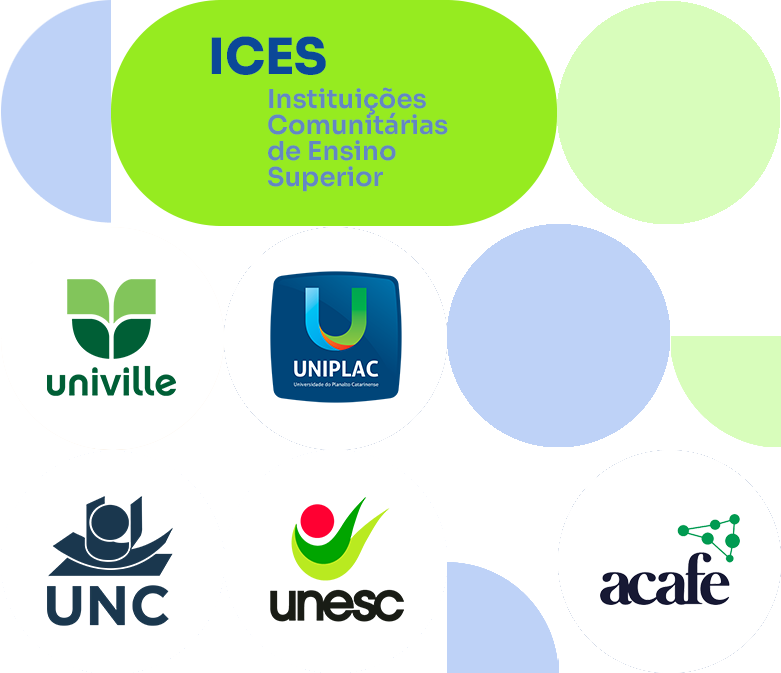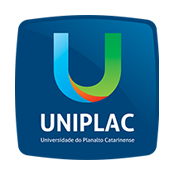About the program and associated HEIs
THE PROGRAM
In Brazil, there is heterogeneity in the performance capacity of skills in Production Systems that can be improved through the training of human resources.
The PPGSP proposes to develop actions to promote technological innovation and increased competitiveness, contributing to the structuring of production systems.

ASSOCIATED IES
The Postgraduate Program in Productive Systems (PPGSP) in partnership between the University of Planalto Catarinense (UNIPLAC), the University of Contestado (UNC), the University of Extremo Sul Catarinense (UNESC) and the University of the Joinville Region (UNIVILLE), is the first program in the interdisciplinary area, in partnership, approved in Community HEIs in the south of Brazil. Through cooperation between universities, they integrate science and technology parks, social innovation parks and technology incubators in the state of Santa Catarina.
These universities are members of the ACAFE System (Santa Catarina Association of Educational Foundations), a non-profit civil society created in 1974 to bring together educational foundations in the state of Santa Catarina.
The PPGSP seeks to develop science, technology and innovation by sharing actions and skills to promote the humanistic, technical-scientific and cultural education of its students, through teaching, research and extension, prioritizing the development and improvement of productive systems in a sustainable manner.
In 2016, a group of Community HEIs from Santa Catarina began a study to develop a Master's Degree project in an Associative format in Production Systems. Based on this study, a working group was appointed to analyze the demand in the region covered by the HEIs. After extensive discussion, it was decided to concentrate efforts to offer the Program in the mesoregions of Serrana, Sul Catarinense, Norte Catarinense and Oeste Catarinense.
The participating HEIs have their origins in a state policy of interiorization of higher education, with the objective of promoting local and regional development. These HEIs are recognized as agents that drive development, due to their interaction with local and regional communities. They play an important role as development agents, through actions that go beyond quality education, as they train citizens committed to local and regional development.
The PPGSP was planned and structured with a greater motivation to offer opportunities for training and continuing high-level studies for the aforementioned mesoregions, with an emphasis on the relevant contribution to organizational and regional development, public and private, in the aspects of competitiveness and innovation.
The PPGSP provides greater visibility to the social commitment to the knowledge society, achieving robust research, seeking to meet the needs for sustainable productive development and the promotion of cleaner technologies.
Since 2016, PPGSP researchers have worked collaboratively on research projects in different areas of knowledge. They are researchers who develop work together with scholarship students and/or volunteers to promote regional, social, economic and environmental development.
The PPGSP meets the demands of HEIs, seeking to strengthen their objectives focused on issues of social responsibility, both in the formation of citizens and in the identification of community problems and regional development. In this sense, it plays a fundamental role in the interaction with local and regional communities, as well as in assisting in the search for concrete results for environmental, economic and social development.
PROGRAM OBJECTIVES
The Postgraduate Program in Production Systems aims to:
I. Train researchers to work in various sectors and strategic fields of society, related to innovation, sustainability, management and organizational knowledge in production systems;
II. Contribute to scientific advancement, appropriation and production of knowledge in the Interdisciplinary area of aspects involving Engineering/Technology/Management;
III. Develop interdisciplinary and interprofessional activities and research with the participation of students and teachers, giving broad visibility to the program through scientific publications, events and business partnerships;
IV. Interact continuously and systematically with public, private and third sector organizations as a strategy for insertion and meeting society's demands;
V. Promote the development of products, processes or services through scientific and/or technological knowledge, with an emphasis on sustainability

TARGET AUDIENCE AND TRAINING
Due to its interdisciplinary nature, the PPGSP is open to candidates with undergraduate degrees (bachelors, graduates or technologists) in any area of knowledge, who seek academic and scientific improvement, through qualified training, developing research that contributes to the improvement of products, processes and services, subsidizing innovative proposals applied to contemporary organizational management.
In the training of postgraduate students, the PPGSP will provide an opportunity for an in-depth study of production systems in their management, technology, product, service and process improvement aspects, understanding their development with the aim of contributing to social, economic and environmental developments.
Thus, the PPGSP provides continued training of human resources for teaching, working in the job market and research, focused on generating knowledge, from which applications can be extracted that aim to solve problems and study alternatives for technological advances in production systems.

Thus, interdisciplinary training occurs through collaborative work with the integration of research projects and mandatory and optional subjects. Interdisciplinarity and collaboration encourage the training of qualified researchers who are capable of dialoguing with the research lines to strengthen the different fields of activity.
Thus, the associated master's degree aims to train researchers with a systemic and interdisciplinary vision, with the ability to understand and promote the development of Production Systems in the area of concentration in Engineering and Management in Production Systems.
AREA OF CONCENTRATION AND LINES OF RESEARCH
Production systems have, in their large and small-scale operations, the need for optimizations and studies that minimize their weaknesses and maximize their effectiveness, which can be solved by future research capable of speeding up process gains, as well as reducing costs and waste in a sustainable manner.
The presence of high complexity in regional production systems requires research alternatives that focus on the development and application of innovative methodologies, aimed at making them more sustainable and effective in their management and resources. The PPGSP's area of concentration was conceived in view of these demands: Engineering and Management in Production Systems, which in turn is divided into two lines of research, Production Systems and Sustainability and Management and Knowledge in Production Systems.
The research line, Management and Knowledge in Production Systems, aims to investigate production systems, through scientific and/or technological knowledge in different contexts. It proposes to act in an interdisciplinary manner on the themes of Strategy and organizational learning, Knowledge management, Innovation and Sustainability; Business intelligence; Process and production management.
The research line, Production Systems and Sustainability, aims to promote the development of products, processes or services through scientific and/or technological knowledge, taking into account the economic, environmental, social aspects and the paradigms of the circular economy. It proposes to act in an interdisciplinary manner, with innovative themes in Reuse and valorization of waste, Development of sustainable technologies, Cleaner technologies and Optimization of production chains.
Furthermore, the PPGSP research lines are linked to the institutional research lines of the associated ICES, which allows the consolidation of research groups and the permanent dialogue between professors and students, promoting knowledge aligned with Engineering, Technology and Management in Production Systems, with the aim of developing skills and abilities.
Associated Universities
UNC - Universidade do Contestado
It is located in the western mesoregion and is formed by the Canoinhas, Concórdia, Curitibanos, Mafra, Porto União and Rio Negrinho campuses, as well as 17 distance learning centers located in the state of Santa Catarina. Today, UnC is present in 15% of the state of Santa Catarina, reaching a population of almost 2 million people.
Unesc - Universidade do Extremo Sul Catarinense
It is located in the mesoregion of Southern Santa Catarina, in the city of Criciúma (headquarters) and has an advanced Campus in Araranguá, as well as EAD centers. The municipality of Criciúma has an estimated population of 217,311 inhabitants and occupies an area of 235.6 km².
Univille - Universidade da Região de Joinville
It is present in the North mesoregion and has its headquarters at the Joinville Campus. There is also the São Bento do Sul Campus, the São Francisco do Sul Unit and the Joinville Centro Unit. Joinville is the most populous municipality in Santa Catarina with 597,658 inhabitants and has an area of 1,126.106 km².









